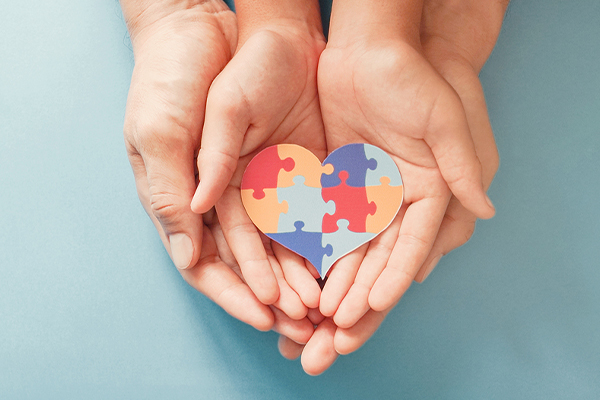About 1 out of every 54 children in the U.S. is diagnosed with an autism spectrum disorder, according to the U.S. Centers for Disease Control and Prevention. But what happens when these children grow up?
Roughly 50% of people living with autism have what’s called “high-functioning” autism—which means they can go to school, work and live on their own. Still, just like for all of us, there can be challenges, which makes communication with family, friends, coworkers and, sometimes, medical professionals an important part of their daily lives, too.
At Work
We tend to look for jobs that fit our personality and interests, and that’s the same for people with autism. Many people living with autism enjoy patterns and exactness, and others may have more limited social skills. So a wide range of work possibilities exist, from technological positions to support jobs in any number of industries.
“Lots of folks with autism really like routine. There’s a way they’ve got to do things,” said Dr. Dale Peeples, a child and adolescent psychiatrist at Augusta University Health. “They feel more comfortable that way, and if that routine gets interrupted, that can cause a lot of emotional frustration for them.”
As a result, customer-facing positions, where jobs can change minute by minute, aren’t necessarily the best fit. “So know your strengths, and know that people skills might not be the number-one thing you do,” said Peeples.
But should you tell your future employer you have autism? While potential employers are technically not allowed to discriminate, people with autism might worry that they’ll be put at a disadvantage if they do tell. The answer to that question, says Peeples, depends.
“Employers may ask about any accommodations that you need as far as work is concerned,” he said. “But talented and capable folks might wait until they get hired and settled into a job, where they know and trust people, to reveal a little bit more about themselves.” At that point, it might be valuable to talk to your employer about how your people skills aren’t always the best or that you work more efficiently having a regular routine.
In Relationships
In general, adults with autism tend to have very strong relationships with family but don’t seem to have as strong a desire for a large social network or romantic relationships.
“In communication, people with autism can be very concrete in what they say. They say what they mean and they interpret other people in that same manner, so they can miss nuances,” said Peeples. “They can be very blunt, and they’re a little bit less likely to do the little white lies and smoothing things out socially. So these are some of the challenges they can run into.”
Still, many people with autism see those kinds of relationships and want to explore them. One option, says Peeples, is for them to seek out support networks and communities that are welcoming. For example, he says, he knows of one patient who became very involved with a church organization, even though his family was not religious. Also, people with autism often have deep knowledge or expertise in a particular subject and can join communities of people with that same knowledge. “If they can find the right niche, then they’ve got the culture cache and insight and knowledge realm that can be social capital for them,” said Peeples.
Out in the World
All of us experience everyday annoyances, whether that’s someone cutting in line at the grocery store or seeing someone toss a candy wrapper out of their car and into a parking lot. We might be peeved but might not say or do anything about it. But the person with autism might.
“People with autism are pretty focused on right or wrong and how things should be,” said Peeples. “So if they see someone where they interpret the behavior as rule-breaking, they can sometimes feel that something needs to be done about it now. They’re more likely to call out the individual than you or I might.”
We also are faced with new situations and unexpected challenges every day and have to figure out how to manage and navigate them. For people with autism who tend to be most comfortable with the same order and routine to their day, these challenges can feel too big to fix.
How much these daily curveballs affect people with autism depends on their level of functioning, their other strengths and their support network. But this is when professional help in the form of a small group or a therapist could help them figure out a solution.
“People with high-functioning autism are able to be successful academically and occupationally,” said Peeples. “They might not have a regular need for a therapist. But if you’re talking about a transitional age where they’re going to college, starting the workforce, figuring out how to live on their own or any other challenges, having a therapist or small group to talk to and problem solve might be very, very useful.”





